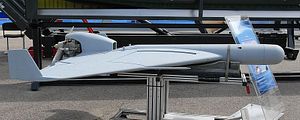The idea that killer robots will soon be a reality in Southeast Asia may seem far-fetched to some. But this rapidly advancing domain of defense technology is gaining ground in and around Southeast Asia, and states need to prepare for the arrival of lethal autonomous weapons systems (LAWS) in the near future. The best way of doing so is to support a growing global coalition advocating for an international ban on their use and development.
This week, the Campaign to Stop Killer Robots officially launched in Southeast Asia as a regional coalition of civil society groups held the movement’s first regional strategy consultations in Bangkok to chart the course ahead. The Campaign advocates for an international ban on LAWS and the weaponization of artificial intelligence (AI). Their principal concern lies in the amplification of the ethical risks in warfare when humans are removed from operating a weapon’s lethal functions.
When discussing LAWS, I’m not talking about Terminator robots kicking off the apocalypse. Instead, consider a drone operating over a large area of engagement, using facial recognition technology to search for, identify, and eliminate enemy combatants and infrastructure, all on its own. Without a human operator to interpret the broader context, as well as the removal of human accountability in making the decision to kill, the risks posed to civilians are hugely expanded.
These risks are easy to comprehend. Yet one of the main challenges identified for the Campaign to Stop Killer Robots will be in making this issue not just relevant, but actionable for the governments of the region. Why should the government of the Philippines, for instance, be worried about this seemingly distant prospect when it has so many other social and security issues to deal with that are here, right now?
Make no mistake – LAWS are here. Israel has already developed the IAI Harpy, a “loitering munition,” which is a drone designed to identify and destroy anti-air defenses. It has been sold to India, China, and South Korea. Within the region, Singapore is exploring how to incorporate AI processes into its defense structure as it seeks to maximize combat effectiveness with minimal manpower.
Southeast Asia is surrounded by superpowers, and within the region, states are committed to maintaining a sensitive power balance with their neighbors. According to Fred Lubang, a campaigner from the Philippines, “Asia has been a testing ground for new and advanced weapons throughout the wars of its recent past: nuclear weapons in Japan; armed drones in Pakistan and Afghanistan; Agent Orange in Vietnam, among others.” Thus, the region is highly prone to and threatened by arms races held on uneven grounds. How can Laos or Cambodia hope to respond to the emergence of automated arsenals beyond their borders? How can Indonesia and Malaysia preserve national resources from getting sucked into destabilizing arms programs?
The answer is by supporting and advancing a universal ban on the use and development of LAWS on the global stage. The states of the region have very little to gain from the arrival of these weapons, but much to lose. Mitzi Austero, the regional campaign organizer, pointed out that the region is still addressing the impact of older weapons like landmines and cluster bombs, not to mention the violence resulting from the proliferation of small arms and light weapons. Adding more advanced weapons systems into the mix will only amplify regional threats.
Furthermore, a universally accepted ban would allow for the development of AI for productive military means that could greatly benefit the security forces of the region without jeopardizing regional stability. Consider that Singapore is developing AI systems to scan planes for potential flaws, or that it is developing systems to better police its shores and waterways by identifying and tracking suspicious vessels.
Much could be gained for the national security of ASEAN states if there is a commitment to develop AI in the defense sector only for nonviolent means. Drones with self-learning scanning and identification functions could indeed help countries like Vietnam and the Philippines develop better search and rescue capacities, or police rural border areas and vast stretches of ocean where the trafficking of drugs, firearms, and natural resources thrives.
The Campaign to Stop Killer Robots is not opposed to the humanitarian application of AI systems, especially in a region prone to natural disasters. But there needs to be a commitment by states not to weaponize these applications, otherwise the national and individual security of the region and its inhabitants will be irreversibly compromised.
So far, there is still little international consensus on how to tackle the development and use of AI for military purposes. According to Yunizar Adiputera, an Indonesian advocate, this adds to the confusion on how to discuss the ban. But the conversation is happening, and countries and international platforms are increasingly releasing ethical guidelines that touch on the issue. Southeast Asia must insert itself into this process, and not relegate the major decisions of regulating this technology to those superpowers who have the most to gain from it.
The Campaign to Stop Killer Robots, therefore, hopes to stimulate this involvement among state actors, and engage the invaluable support of industry, research, and civil society groups concerned with the implications of LAWS. Only through an international ban would Southeast Asia’s security and prosperity be safeguarded.
Michael Picard is an independent researcher specializing in arms control and armed violence in Southeast Asia. He has researched the arms trade and armed violence in the region for the Small Arms Survey as well as GunPolicy.org.

































